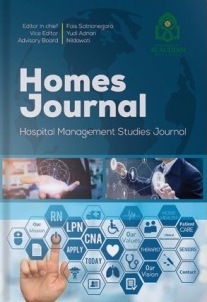RELATIONSHIP BETWEEN WORK STRESS AND WORK MOTIVATION TOWARDS NURSE PERFORMANCE
Abstract
Background: Data from the World Health Organization shows that the number of nurses in 2019 was around 19.3 million, while in Indonesia it was 147,264. The current ratio of nurses is 87.65 per 100,000 population, meaning that it is still very far from the national target of 180 per 100,000 population. The condition of nurses is still very limited, so it takes effort and motivation to improve the performance of nurses so that the nurses do not experience work stress.
Objective:To analyze the relationship between work stress and work motivation on the performance of nurses at Puskesmas Malili Kab. East Luwu.
Method:This study used a cross-sectional study design. The sampling technique in this study was to use accidental sampling on nurses at the Malili Public Health Center, East Luwu Regency.
Result:The results showed that there was a relationship between job stress and work motivation on nurses' performance.
Conclusion: Continuous efforts are needed to prevent work stress on nurses and increase motivation so that all nurses can perform well without high stress. Motivation is an important thing to pay attention to because it determines the performance of nurses. Hospital leaders are expected to instill a sense of responsibility towards nurses because their job is to serve patients.
References
Adnyaswari, N. A. (2017). Pengaruh Dukungan Sosial Dan Burnout Terhadap Kinerja Perawat Rawat Inap RSUP Sanglah. E-Journal Management Unud, 1(8), 120–135.
Almustofa, R. (2014). Pengaruh Lingkungan Kerja, Motivasi Kerja, Disiplin Kerja Terhadap Kinerja Pegawai(Studi Pada Pegawai Perum Bulog Divisi Regional Jakarta). Jurnal Administrasi Bisnis, 1(2), 1–20.
Anggitasari N, Budiman, Rosnawati. (2019). Hubungan stres kerja dan motivasi kerja dengan kinerja perawat di Rumah. Jurnal Kolaboratif Sains, 1 (1), 147- 156.
Aprilia, Friska, et al. (2017). Pengaruh Beban Kerja, Stres Kerja Dan Motivasi Kerja Terhadap Kinerja Perawat Rumah Sakit Islam Ibnu Sina Pekanbaru. Jurnal Online Mahasiswa Fakultas Ekonomi Universitas Riau, 4 (1), 87-100.
Bagiada, I., & Netra, I. (2019). Pengaruh Stres Kerja, Burnout Dan Motivasi Kerja Terhadap Kinerja Perawat Rsd Mangusada Kabupaten Badung. E-Jurnal Ekonomi Dan Bisnis Universitas Udayana, 8 (5), 493-524. doi:10.24843/EEB.2019.v08.i05.p04.
Endri, S., & Sudibia, G. A. (2015). Pengaruh Kepemimpinan Transformasional, Motivasi dan Burnout Terhadap Kinerja Karyawan Outsourcing RRI Mataram-Bali. E-Jurnal Manajemen Unud, 4(8), 1–20.
Hummayoun, N. (2015). Impact Of Burnout On Employees Performance: An Analysis Of Banking Industry. Management and Sustainable Development, 11(1), 1–10.
Julvia, C. (2016). Pengaruh Stres Kerja Dan Konflik Kerja Terhadap Kinerja Karyawan. Jurnal Imiah Manajemen Bisnis, 16(1), 1–23.
Larasati, S., & Gilang, A. (2014). Pengaruh Motivasi Kerja terhadap Kinerja Karyawan Wilayah Telkom Jabar Barat Utara (Witel Bekasi). Jurnal Universitas Telkom, 1(2), 1–10.
Maharani, R., & Budianto, A. (2019). Pengaruh Beban Kerja Terhadap Stres Kerja dan Kinerja Perawat Rawat Inap. Journal of Management Review, 3(2), 327-332.
Mohtaram, N. T. (2015). Dispositional effects on Job Stressors and Job Satisfaction: The Role of Core Evaluations. Social and Behavioral Sciences, 18(1), 61 – 68.
Mutaqillah, Lubis R A, Majid A S,M. (2015). Pengaruh Stres Kerja Dan Motivasi Kerja Terhadap Kinerja Perawat Serta Implikasinya Pada Kinerja Badan Layanan Umum Daerah Rumah Sakit Jiwa (BLUD RSJ) Aceh. Jurnal Manajemen Pascasarjana Universitas Syiah Kuala, 4 (1), 144 – 153.
Wartono, T. (2017). Pengaruh Stres Kerja Terhadap Kinerja Karyawan (Studi Pada Karyawan Majalah Mother And Baby). Jurnal Ilmiah Prodi, 1(1), 1–12.
Widyastuti, N. (2015). Pengaruh Stres Kerja Dan Beban Kerja Terhadap Kinerja SKPD Kabupaten Sintang Kalimantan Barat. Jurnal Maksipreneur, 4 (2), 15 –27.
Widnyana, Sintaasih, & Riana. (2016). Efek Pemoderasian Status Kepegawaian Pada Pengaruh Motivasi Dan Komitmen Organisasional Terhadap Kinerja Karyawan. Jurnal Manajemen, 10(1), 1–10.


